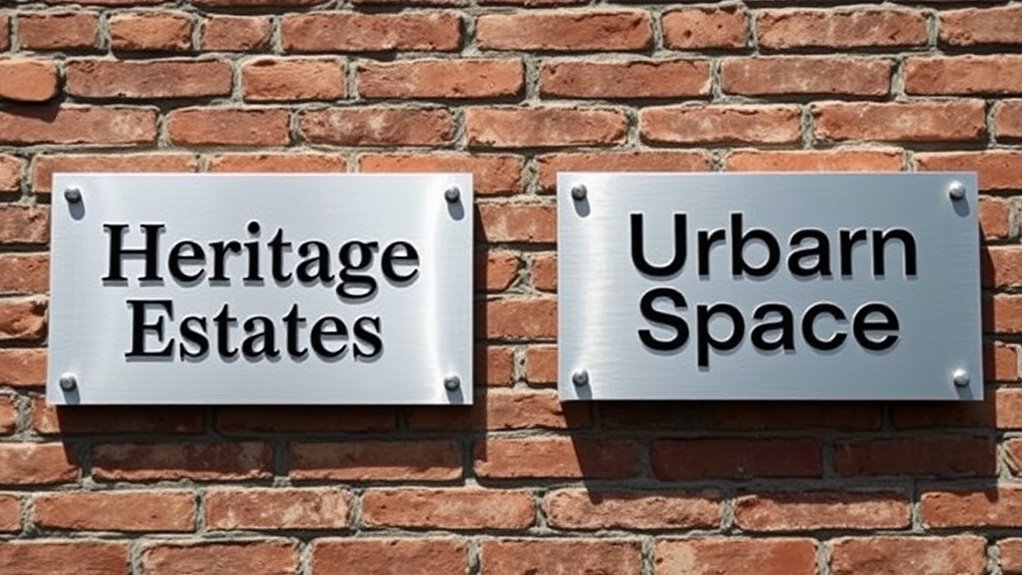Choosing a strategic real estate business names builds trust and sets you apart. Start by reflecting your brand essence and target audience, using location-based or personalized elements for authenticity. Combine traditional terms like “Realty” with modern twists for memorability. Add catchy phrases or alliterations to enhance recall. Verify uniqueness and secure matching domains to avoid legal issues. Align your name with your niche and values for lasting impact. Discover how to craft a name that resonates deeply.
Key Takeaways
- Incorporate location-based terms to establish community connection and local market relevance.
- Use alliterations, rhymes, or catchy phrases to enhance memorability and brand appeal.
- Blend traditional terms like “Realty” or modern creativity for a distinctive and professional identity.
- Ensure uniqueness by verifying trademark availability and securing matching domain names.
- Reflect your target audience’s emotions and aspirations to build trust and attract clients.
Importance of a Strategic Real Estate Business Names
When you’re building a real estate business, choosing a strategic name isn’t just a formality—it’s a critical decision that shapes your brand’s identity and client relationships. A strategic real estate business name acts as your first impression, instantly signaling professionalism and reliability to your target market. In a competitive industry where one out of every $6 of U.S. GDP is tied to real estate, standing out is essential. Your name can differentiate you, making it easier for clients to remember and recommend you. It also communicates your niche, whether you focus on residential, commercial, or investment properties, attracting the right audience. More than just a label, your name reflects your values and vision, setting the tone for every interaction. By aligning your strategic real estate business name with your brand identity, you’ll build trust, recognition, and long-term client loyalty. Early investment in real estate, such as house hacking, can provide a solid foundation for building a successful business and financial stability.
Creative Techniques for Naming Your Real Estate Business
Crafting a compelling real estate business name demands creativity and strategy to guarantee it stands out in a crowded market. Start by choosing the right name that reflects your brand’s essence while resonating with your target audience. Incorporate location-based elements to foster trust and connection with the local community. For instance, weaving in neighborhood landmarks or regional identifiers makes your real estate company names feel familiar and approachable. Aim for catchy real estate business names that use alliterations, rhymes, or short, impactful phrases—these are easier to remember and more likely to stick in clients’ minds. Explore foreign or Latin terms to infuse elegance and cosmopolitan appeal. Don’t shy away from personalizing by including your name; it adds authenticity and authority. Keep it concise for versatility across marketing platforms, ensuring your business identity remains clear and adaptable.
Traditional vs. Modern Real Estate Business Names

If you’re weighing traditional naming trends, you’ll find established terms like “Realty” and “Properties” build trust, anchoring your brand in reliability and community ties. On the flip side, modern naming innovations let you craft a standout identity with bold, memorable phrases that appeal to a tech-driven, diverse audience. Choosing between these approaches shapes not just your brand’s image but its connection to evolving market demands.
Traditional Naming Trends
Traditional real estate business names anchor themselves in familiarity and credibility, leveraging terms like “Realty” and “Properties” to signal trust and expertise. When you choose traditional names, you’re positioning your real estate company name as a reliable, established player in the market. These names convey trust by using classic, straightforward language that resonates with clients seeking professionalism. You’ll often see geographic references, like “Heritage Homes” or “Evergreen Realty Co.,” which strengthen local connections. While modern naming trends innovate, traditional names remain powerful for building long-term recognition. They appeal to clients who value expertise and a proven track record. By sticking to these principles, you create a brand that feels dependable and authoritative, ensuring your real estate company name stands the test of time while maintaining its appeal.
Modern Naming Innovations
While traditional real estate business names emphasize stability and familiarity, modern naming innovations focus on creativity and distinctiveness to stand out in a competitive market. You’ll find that a catchy real estate business name often blends creativity with memorability, using unique names that break from conventional norms. These modern naming innovations leverage invented or compound names, like “SkyLoft Realty” or “UrbanNest,” to create a distinct identity. Alliteration and playful phrases, such as “Pine Point Properties,” make your brand more memorable. Incorporating descriptive elements tied to local culture or landmarks can also foster community connection. By balancing creativity with strategic relevance, you’ll craft a name that resonates with diverse audiences while ensuring your business stands out.
| Approach | Example | Benefit |
|---|---|---|
| Invented Names | Manor & Co. | Unique identity |
| Compound Names | UrbanNest | Memorable and modern |
| Alliteration | Pine Point Properties | Catchy and easy to recall |
| Descriptive | SkyLoft Realty | Links to local imagery |
| Playful Phrases | Home Haven | Friendly and approachable |
Incorporating Location and Specialization Into Names
By weaving location and specialization into your real estate business name, you create a brand that’s both memorable and purpose-driven. Including a location grounds your business in a specific community, fostering trust and recognition among local clients. For example, names like “Capitol Hill Properties” instantly signal your connection to the area, while also boosting SEO for location-based searches. Pairing location with specialization sharpens your appeal to targeted demographics. If you focus on luxury homes, try “Bluegrass Luxury Estates” for a refined, regional touch. Or, if commercial properties are your niche, “Downtown Commercial Experts” clearly communicates your expertise. Combining these elements not only differentiates your brand but also highlights your commitment to serving specific market needs. Think strategically: a name like “Coastal Condo Specialists” instantly tells clients what you do and where you excel. This dual approach guarantees your real estate business name resonates with both market demand and local identity. Incorporating local SEO strategies into your naming process ensures your business stands out in local searches and attracts targeted traffic.
Enhancing Memorability With Catchy Phrases and Alliterations

Tap into emotional impact branding by crafting names that evoke trust and aspiration, instantly connecting with clients’ dreams. Use rhythmic name creation techniques like alliteration to make your business stand out and stick in their minds effortlessly. Optimize for visual sign appeal with concise, catchy phrases that guarantee your brand leaves a lasting impression, even at a glance. Enhance your strategy by leveraging real estate software for deeper market insights and streamlined property management.
Emotional Impact Branding
Imagination fuels the power of emotional impact branding, transforming real estate business names into unforgettable experiences. You can create a catchy real estate company name that resonates deeply by evoking emotions like trust, comfort, and aspiration. Alliterations, rhymes, and clever wordplay amplify memorability, making your brand stick in clients’ minds. For instance, names like “Serene Spaces” or “Homeward Haven” tap into feelings of security and belonging. Crafting a brand that looks visually appealing on signage and digital ads guarantees consistency, further enhancing recall. Strategic emotional impact branding not only attracts clients but also builds lasting connections, setting you apart in a competitive market. Incorporating SEO strategies into your branding ensures long-term visibility and client engagement.
| Technique | Emotional Impact |
|---|---|
| Alliteration | Creates rhythmic, memorable phrases |
| Rhymes | Enhances phonetic stickiness |
| Imaginery | Evokes feelings of home and community |
| Wordplay | Adds approachability and charm |
| Visual Consistency | Boosts recognition across platforms |
Rhythmic Name Creation
Creating rhythmic real estate business names builds on the emotional resonance of branding while adding a layer of memorability. A rhythmic name leverages catchy phrases or alliterations, making it phonetically sticky and easier for clients to recall and share. By incorporating internal rhyme and consonance, you evoke positive emotions and vivid imagery, which strengthens brand recall in a competitive market. Names like “Prime Properties” or “Haven Homes” not only capture attention but also convey trust and community, fostering deeper client connections. In mobile advertising, a concise and rhythmic name increases engagement and recognition, ensuring your brand stands out. A catchy, rhythmic name isn’t just memorable—it’s a strategic tool that enhances your brand’s identity and appeal, driving long-term success. With the growing popularity of co-living spaces, rhythmic names can also highlight modern housing trends, attracting younger demographics.
Visual Sign Appeal
Something as simple as a well-crafted name can transform your real estate business sign into a magnet for attention. A catchy name with alliteration or rhythmic phrases, like “Dream Dwellings” or “Perfect Property Partners,” grabs eyes instantly, boosting visual sign appeal. These names stick in minds, making your brand unforgettable. When potential clients see a name that evokes warmth or professionalism, it builds trust and brand recognition. Imagine driving past a sign for “Family First Realty”—it conveys community values and appeals to local buyers. Crisp consonance and internal rhyme make your business stand out in a crowded market. By choosing a name that looks great on signage and resonates emotionally, you’ll attract more inquiries and establish a lasting impression. Invest in a name that works as hard as you do. Pairing your memorable name with direct mail campaigns can further amplify your reach and engagement.
Ensuring Uniqueness and Availability for Your Business Name
Before finalizing your real estate business name, you’ll need to ascertain it’s both unique and available to avoid legal complications and establish a strong brand identity. Start with a trademark search using the USPTO database to ascertain your chosen name isn’t already protected. Next, verify name availability through your state’s business registry to prevent duplication and comply with local regulations. Don’t stop there—conduct internet searches to confirm no other real estate companies in your area are already using the name, as this could lead to market confusion. Secure a matching domain and consistent social media handles to maintain cohesive branding. To stand out, consider crafting a unique combination of keywords or innovative variations that reflect your brand’s essence. This strategic approach ascertains your business name is not only legally sound but also distinct and memorable in a competitive market.
Key Considerations for Brand Identity and Target Audience

A strong real estate business name doesn’t just meet legal requirements—it captures attention and resonates with your ideal clients. To craft a unique name, focus on your target audience and brand identity. Understand who you’re serving: first-time buyers, luxury property seekers, or investors. Tailor your name to evoke emotions and trust specific to their needs. Incorporate location-based elements to foster community connection, making clients feel secure. Use descriptive language to convey expertise and professionalism. Define your brand identity clearly—decide if you want to project a modern, fun vibe or a traditional, experienced one. This guarantees alignment with customer expectations. Analyze competitors’ branding to stand out in a crowded market. Your name should be memorable, relevant, and reflective of your unique value proposition. Additionally, aligning your branding with market trends can help position your business for long-term growth.
| Target Audience | Brand Identity | Unique Name Elements |
|---|---|---|
| First-time homebuyers | Approachable, Trustworthy | “DreamStarter Homes” |
| Luxury property seekers | Elegant, Exclusive | “Crestview Estates” |
| Investors | Reliable, Results-driven | “PrimeGrowth Properties” |
| Families
Real Estate Niche-Specific Name Ideas and Examples
Crafting a niche-specific real estate business name can instantly position you as an expert in your target market. These names not only resonate with potential buyers but also highlight your specialized services. For instance, “Urban Commercial Realty” clearly focuses on business spaces, while “First Home Advisors” targets first-time buyers. Niche-specific names like “Lakefront Properties” or “Mountain View Realty” create a local connection, building trust within the community. Similarly, names such as “Wealth Builders Realty” appeal to investors seeking financial growth. Here’s how you can craft effective real estate names:
- Use descriptive terms: Words like “Luxury,” “Commercial,” or “Residential” clarify your focus.
- Incorporate local geography: Names tied to specific areas, like “Sunset Beach Realty,” foster community trust.
- Evoke emotional appeal: Phrases like “Nest Egg Properties” connect with buyers’ aspirations and dreams.
- Align with tenant demographics: Tailoring your business name to specific tenant profiles enhances market appeal and attracts the right audience.
Conclusion
Choosing the right real estate business name isn’t just branding—it’s psychology. Studies show names with alliteration or local ties boost recall by 30%. You’ll blend tradition with innovation, ensuring your name resonates with your audience while standing out. Test its uniqueness and availability to avoid legal pitfalls. A strategic name positions you as an authority, not just another agent. Craft it wisely—it’s your first impression and lasting legacy in a competitive market.




